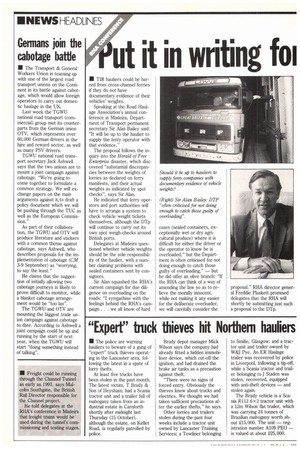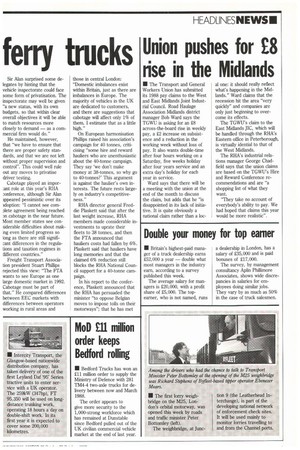ut it in writing foi ferry trucks
Page 6

Page 7

If you've noticed an error in this article please click here to report it so we can fix it.
• TIR hauliers could be barred from cross-channel ferries if they do not have documentary evidence of their vehicles' weights.
Speaking at the Road Haulage Association's annual conference in Madeira, Department of Transport permanent secretary Sir Alan Bailey said: "It will be up to the haulier to supply the ferry operator with that evidence."
The proposal follows the inquiry into the Herald of Free Enterprise disaster, which discovered "substantial discrepancies between the weights of lorries as declared on ferry manifests, and their actual weights as indicated by spot checks", says Sir Alan.
He indicated that ferry operators and port authorities will have to arrange a system to check vehicle weight tickets themselves, although the DTp will continue to carry out its own spot weigh-checks around British ports.
Delegates at Madeira questioned whether vehicle weights should be the sole responsibility of the haulier, with a number claiming problems with sealed containers sent by consignors.
Sir Alan squashed the RHA's current campaign for due diligence on overloading on the roads: "I sympathise with the feelings behind the RHA's campaign . . we all know of hard (Right) Sir Alan Bailey: DTP "often criticised for not doing enough to catch those guilty of overloading".
cases (sealed containers, exceptionally wet or dry agricultural produce) where it is difficult for either the driver or the operator to know he is overloaded," but the Department is often criticised for not doing enough to catch those guilty of overloading," — but he did offer an olive branch: "If the RBA can think of a way of amending the law so as to relieve the morally innocent, while not making it any easier for the deliberate overloader, we will carefully consider the proposal." RHA director general Freddie Plaskett promised delegates that the RHA will shortly be submitting just such a proposal to the DTp. Sir Alan surprised some delegates by hinting that the vehicle inspectorate could face some form of privatisation. The inspectorate may well be given "a new status, with its own budgets, so that within clear overall objectives it will be able to match resources more closely to demand — as a commercial firm would do."
He maintained, however, that "we have to ensure that there are proper safety standards, and that we are not left without proper supervision and control". This could well rule out any moves to privatise driver testing.
Cabotage played an impor-.ant role at this year's RHA onference, although Sir Alan appeared pessimistic over its adoption: "I cannot see cornFilete agreement being reached
cabotage in the near future. Most member states see considerable difficulties about making even limited progress so long as there are still significant differences in the regulations and taxation regimes in different countries."
Freight Transport Association president Stuart Phillips rejected this view: "The FTA wants to see Europe as one large domestic market in 1992. Cabotage must be part of that" He compared differences between EEC markets with differences between operators working in rural areas and those in central London: "Domestic imbalances exist within Britain, just as there are imbalances in Europe. The majority of vehicles in the UK are dedicated to customers, and there are suggestions that cabotage will affect only 1% of them. I estimate that as a little high."
On European harmonisation Phillips raised his association's campaign for 40 tonnes, criticising "some hire and reward hauliers who are unenthusiastic about the 40-tonne campaign. They say 'we don't make money at 38-tonnes, so why go to 40-tonnes?' This argument is against the haulier's own interests. The future rests largely on industry's competitiveness."
RHA director general Freddie Plaskett said that after the last weight increase, RHA members made considerable investments to uprate their fleets to 38 tonnes, and then the FTA announced that hauliers costs had fallen by 6%. Plaskett said that hauliers have long memories and that the claimed 6% reduction still blocks the RHA National Council support for a 40-tonne campaign.
In his report to the conference, Plaskett announced that the RHA has persuaded the minister "to oppose Belgian moves to impose tolls on their motorways"; that he has met












































































































































































